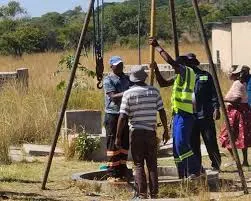Zimbabwe News Update
📅 Published: August 18, 2025
📰 Source: zimeye
Curated by AllZimNews.com
📅 Published: August 18, 2025
Curated by AllZimNews.com
The government itself has tacitly admitted failure in providing reliable water services.
Through the launch of the Presidential Borehole Scheme, it has resorted to drilling boreholes across the country in an attempt to cushion communities from perennial water shortages.
On the surface, this appears to be a positive step.
Yet, beneath the veneer lies a troubling contradiction: the same government that cannot provide its citizens with basic tap water now demands a staggering US$300 fee for households to drill their own boreholes.
This levy, imposed through statutory instruments, amounts to punishing citizens for the failures of government and local authorities.
In a nation where access to clean water is enshrined as a fundamental human right under the Constitution, the imposition of such a cost is both unjust and unethical.
Zimbabwe’s water infrastructure, once envied across the region, has collapsed.
In cities like Harare and Bulawayo, water rationing is no longer the exception but the norm.
Residents go for days, sometimes weeks, without receiving a drop through their taps.
Pipes are burst, treatment plants outdated and pumping stations crippled by years of neglect, corruption and mismanagement.
Local authorities, starved of investment and resources, have failed to maintain the systems inherited from colonial times.
Harare, with a population of over two million, relies on Lake Chivero, a water body long contaminated by industrial effluent, sewage and agricultural run-off.
The city’s Morton Jaffray Water Treatment Plant operates well below capacity, while chronic shortages of chemicals mean even the limited water that can be treated is often unsafe.
Meanwhile, Bulawayo faces an equally dire crisis.
The Matabeleland region’s semi-arid conditions have always posed challenges, but the lack of long-term planning has made matters worse.
📖 Continue Reading
This is a preview of the full article. To read the complete story, click the button below to visit zimeye.
AllZimNews aggregates content from various trusted sources to keep you informed.
📰 Source:
zimeye
Aggregated by AllZimNews – Your trusted source for Zimbabwe news
